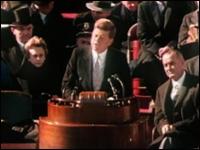Transcript
JOHN F. KENNEDY:
And so, my fellow Americans, ask not what your country can do for you. Ask what you can do for your country.
[APPLAUSE]
BROOKE GLADSTONE:
That was President John F. Kennedy during his 1961 Inaugural Address. When he delivered that line, he was employing what rhetoricians call antimetabole, defined as “the repetition of words in successive clauses in reverse grammatical order.” Winston Churchill used it famously in his Sinews of Peace Address in 1946.
WINSTON CHURCHILL:
Here is the message of the British and American peoples to mankind. Let us preach what we practice, let us practice what we preach.
[APPLAUSE]
BROOKE GLADSTONE:
Juliet Lapidos is an assistant editor at Slate. She says that antimetabole is the hottest rhetorical device of Campaign '08. Juliet, welcome to the show.
JULIET LAPIDOS:
Thanks for having me.
BROOKE GLADSTONE:
So, Republican vice-presidential candidate Sarah Palin used antimetabole to great effect in her acceptance speech at the RNC.
SARAH PALIN:
In politics there are some candidates who use change to promote their careers, and then there are those, like John McCain, who use their careers to promote change.
[APPLAUSE AND CHEERS]
JULIET LAPIDOS:
She really got their basic message in there, which is that Obama might say he’s the candidate of change, but really his campaign is all about his own personality, whereas McCain is about change in a far more substantive way.
BROOKE GLADSTONE:
And the very next night, John McCain, in his acceptance speech, also used it.
JOHN McCAIN:
We were elected to change Washington, and we let Washington change us.
JULIET LAPIDOS:
McCain’s always saying he says things that other people won't dare to say, and so he was owning up to this fact, I suppose, as a preamble to saying, well, that’s what we did in the past, but in the future we're going to do better.
BROOKE GLADSTONE:
Barack Obama used very much the same sentiment just before both of the conventions.
BARACK OBAMA:
Joe Biden is that rare mix. For decades he’s brought change to Washington, but Washington hasn't changed him.
BROOKE GLADSTONE:
Is this a sort of debate by antimetabole?
JULIET LAPIDOS:
It’s as if McCain is going, Obama might say this about his running mate but it’s just not true. I would even admit it of myself that I was changed by Washington. McCain is trying to use the same device to paint himself as a truth-teller.
BROOKE GLADSTONE:
And then later, at the DNC, the Democrats produced even more of these memorable turns of phrase. Let’s start with Bill Clinton.
[APPLAUSE]
BILL CLINTON:
People the world over have always been more impressed by the power of our example than by the example of our power.
[APPLAUSE AND CHEERS]
BROOKE GLADSTONE:
That was actually a rerun, wasn't it?
JULIET LAPIDOS:
That’s right. I think he said it in 1995 and perhaps during a few other speeches, too. It’s really effective, which is probably why he keeps bringing it out [LAUGHS] every now and then.
[LAUGHTER]
BROOKE GLADSTONE:
Now, Hillary, when she was still a candidate in the primary, used antimetabole against her then-opponent.
HILLARY CLINTON:
In the end, the true test is not the speeches a president delivers, it’s whether the president delivers on the speeches.
JULIET LAPIDOS:
The danger of an antimetabole, I think, is that it draws attention to a speech as an overtly rhetorical event, as opposed to an opportunity to communicate policy. And so, she’s doing exactly what she’s accusing her opponent of doing.
[BROOKE LAUGHS]
Just in the very moment where she’s saying, my opponent is a guy who cares a lot about pretty words but pretty words don't make good presidents, she used this incredibly finely-wrought bit of rhetoric.
BROOKE GLADSTONE:
As you mentioned with Hillary, there are some pitfalls involved in using this device. Mitt Romney had some explaining to do when he trotted one out last November, didn't he?
JULIET LAPIDOS:
Right. In his Faith in America speech during the primary season, he said:
MITT ROMNEY:
Freedom requires religion, just as religion requires freedom.
JULIET LAPIDOS:
Does that mean that an atheist is in a state of perpetual bondage or something? [BROOKE LAUGHS] Can an atheist not be free? And he got a lot of questions about it. When I heard that, I sort of thought, that’s an example of a speechwriter getting a little carried away by rhetoric without really paying attention to the message.
BROOKE GLADSTONE:
So why do you think this device has been used so frequently this time around?
JULIET LAPIDOS:
Churchill used it and Kennedy used it, and Jesus used it also. He said, the first will be last and the last will be first. And if it worked for Jesus and Churchill and Kennedy - [BROOKE LAUGHS]
Another possible answer, and this is related to Kennedy, is that it’s related to Kennedy. [LAUGHS] I think his legacy is very much in the air right now, and so maybe people are trying to recapture that a little bit rhetorically with the device that he really loved to deploy. He'd also said, let us never negotiate out of fear.
JOHN F. KENNEDY:
Let us never negotiate out of fear, but let us never fear to negotiate.
[APPLAUSE AND CHEERS]
JULIET LAPIDOS:
I think another possibility is that it seems to enact the change message. There’s nothing that suggests “out with the old and in with the new” like a phrase that does just that. [BROOKE LAUGHS]
You know, this is a device that says, this guy’s A-B, I'm B-A. That guy uses change to promote his career, I use my career to promote change. And this is really an election cycle that’s all about trying to define yourself as something the other guy is not.
BROOKE GLADSTONE:
Juliet, thank you very much.
JULIET LAPIDOS:
Thank you. Thanks for having me.
BROOKE GLADSTONE:
Juliet Lapidos is an assistant editor at Slate.

